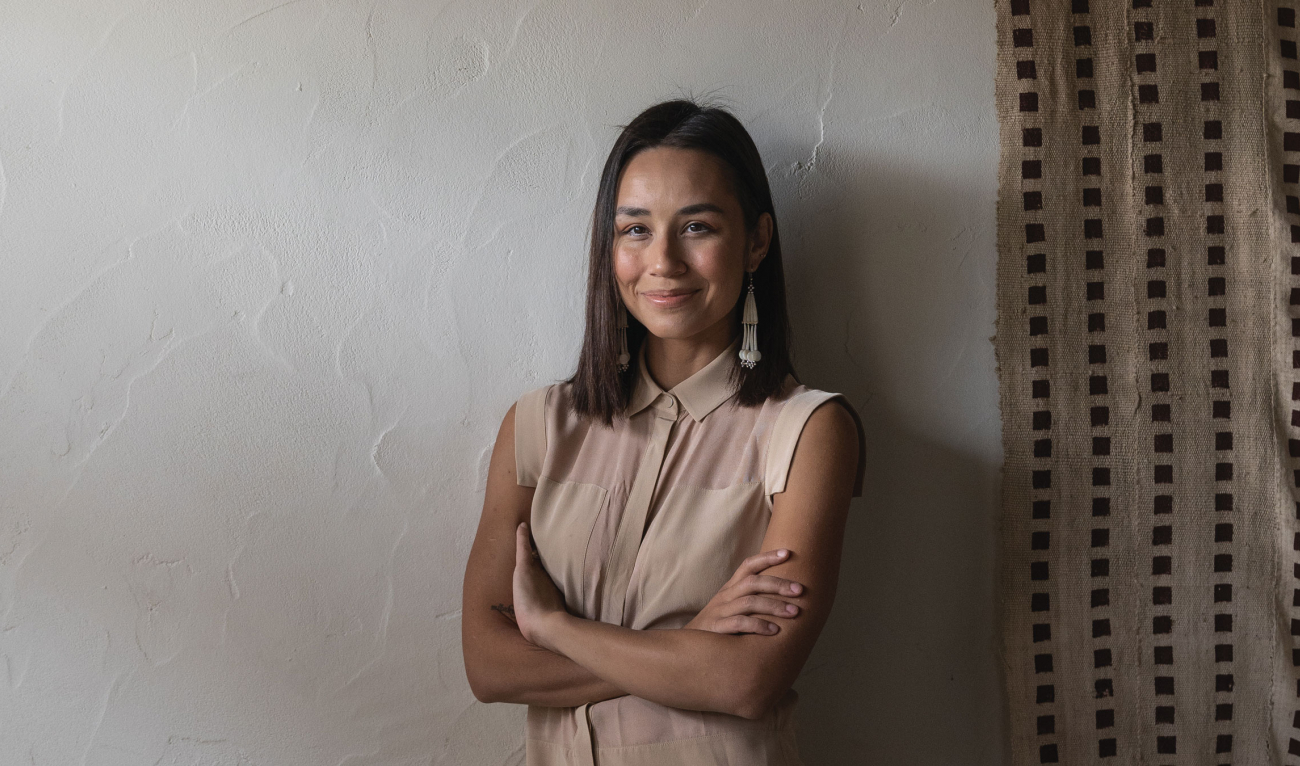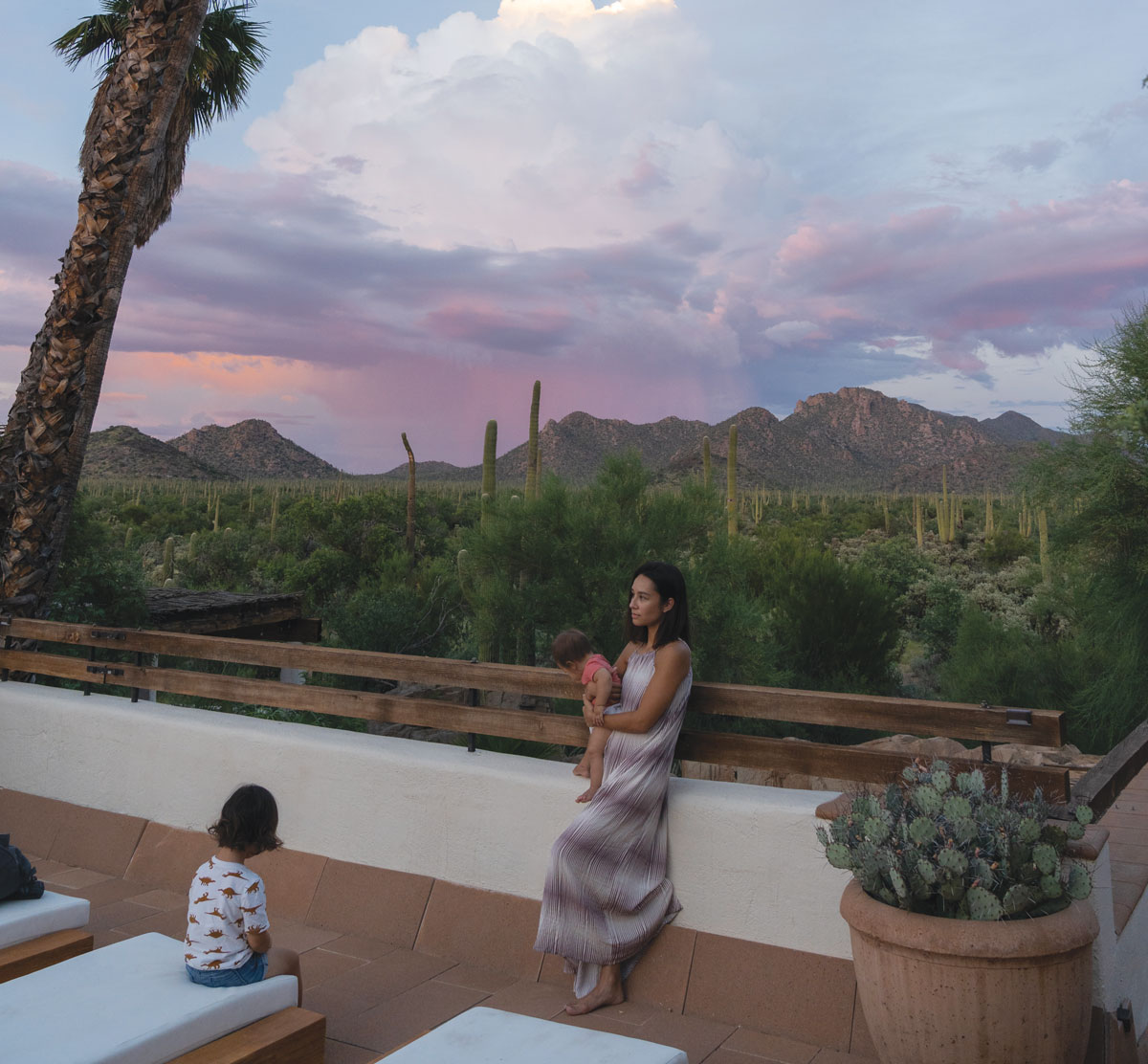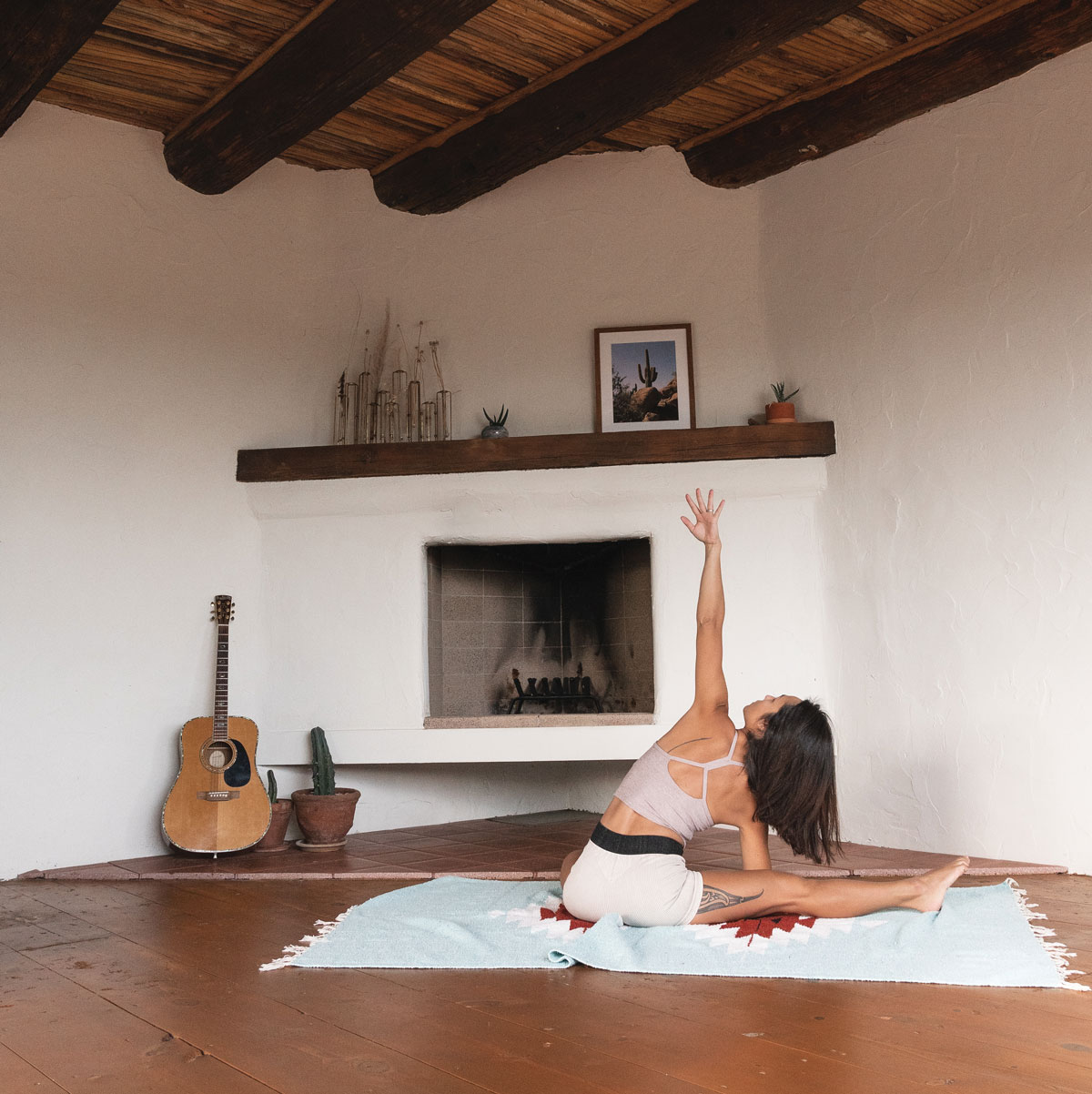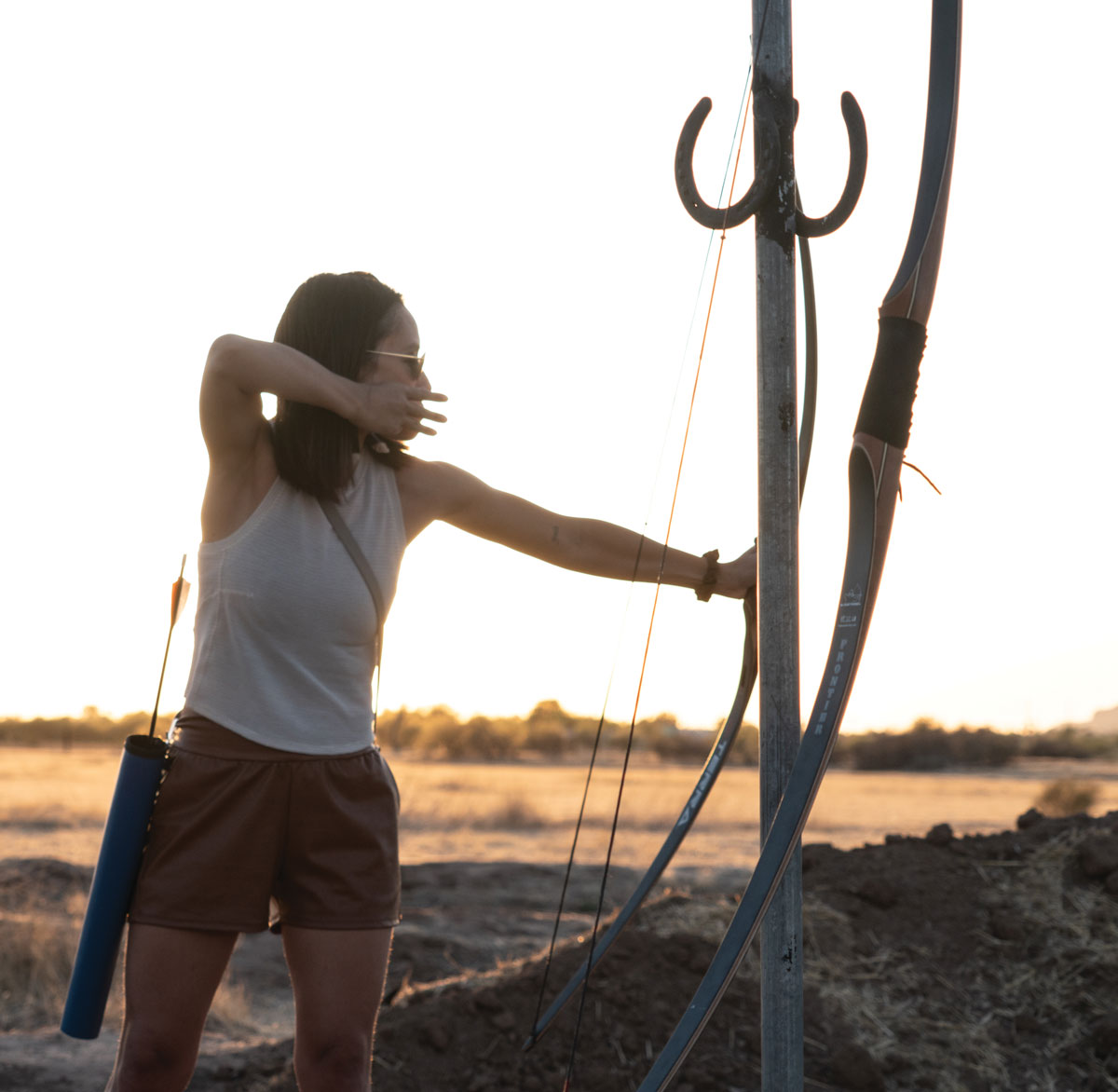Earth Tones
Chelsey Luger’s path to wellness has been anything but a straight line. It started with her earliest memories. In the summers of her childhood, Luger visited her father on the Standing Rock Indian Reservation in her home state of North Dakota. A rancher and business owner, he had drifted from his Catholic upbringing in his 20s and started to attend the ceremonies of his Lakota heritage. He took his three daughters along, and at sweat lodges and Sun Dances, little Chelsey, his youngest, came alive. She loved the smell of the ceremonial fires burning and the aroma of sacred medicines such as sweetgrass and sage. She soaked in the rhythms of the traditional songs. Before and after ceremonies, she delighted in the jokes, the laughter, and the flavors of ancestral foods such as buffalo stew, blue corn mush, wild rice and wasna, dried meat ground with chokecherries.
During the school year, she often visited her grandparents on the Turtle Mountain Reservation and tagged along with her mom, the assistant director for American Indian student services at the University of North Dakota, to picnics and powwows with Native folks from across the region. Her mom’s colleagues became aunties and uncles to her. Luger always knew that her parents (who divorced before she was born) were proud of who they were, and so was she.
By contrast, in the largely white schools she attended in Grand Forks, racism, both overt and implied, filtered through the culture. Her friends’ parents made comments about the reservation as if it were a scary place. Classmates spit remarks that were barbed with stereotypes about Native people. In a North Dakota studies class, one eighth-grade teacher denigrated the Sun Dance as a grotesque relic of the past. Luger, then 14, quaked with rage and frustration. “I raised my hand and I said, ‘Well, we actually still do that. It’s not just history. And it’s not gross,’ ” she says. “My voice was shaking, and I was on the verge of tears. That’s all I could say.”
Today, she would add that the ceremony is sacred and serves as a facilitated prayer for the whole community—and that it has been one of the most meaningful parts of her life. Even at a young age, Luger knew the power of ceremony, community, and culture. But it would take decades for her to fully embody this wisdom in her own unique way and to learn how to powerfully articulate it for others.
Now, in partnership with her husband, Thosh Collins, Luger is an Indigenous wellness activist, educator, and social media ambassador. Together they founded Well for Culture, an initiative dedicated to educating and inspiring Indigenous individuals and communities to reclaim their health for the benefit of themselves and others. “Wellness was so deeply ingrained in our cultural lifeways that we didn’t need a word for wellness,” she says. “It just was life.”
Since Well for Culture’s founding in 2014, with input from elders and others, Luger and Collins have fine-tuned an integrated model for physical, mental, spiritual, and emotional health that they call the Seven Circles of Wellness, which include food, sleep, movement, ceremony, sacred space, land, and community. They travel the country offering presentations at health conferences, universities, schools, corporations, and tribal governments. Luger has also consulted and formed social media partnerships with companies such as Nike, Adidas, and REI. Working out of their home on a sun-bleached street in suburban Phoenix, the couple produces videos and content for their Instagram feeds, which have a combined 100,000 followers, and design their online trainings and presentations.
Luger and Collins prioritize the wellness of Native people in their work, and the majority of their followers are Indigenous, both from the United States and Canada as well as other parts of the world. (Their Well for Culture website has attracted readers from more than two dozen countries.) They recognize their message also resonates with a non-Native audience, especially people who don’t feel represented by the mainstream wellness industry. Their online community includes people of all ages, from children to elders, and from numerous walks of life and racial identities, from Black wellness advocates to white suburban moms. Because of that, Luger and Collins see themselves as emissaries for their culture. “This helps people understand Native people in a much more comprehensive way than pretty much anything they could come across in a history textbook in school or pop culture or Hollywood,” says Luger. “It can help eradicate stereotypes.”
This October, their message is poised to reach more people than ever when the couple’s first book, The Seven Circles: Indigenous Teachings for Living Well, is published by HarperOne, an imprint of HarperCollins. The title includes historical accounts, wisdom from Indigenous thinkers and scholars, and their personal stories, photographs, and anecdotes. But what’s most important to them is to authentically embody and model the circles of wellness in their own lives, not as paragons but as real people and real parents navigating the challenges of contemporary life. The process of attaining wellness, Luger says, is not linear. The balance is always in flux, and the journey never ends.
A self-described nerd and a tomboy as a high school student, Luger was passionate about politics and social justice. She read newspapers every day and watched documentaries in her free time. Outspoken even as a youngster, she fought for the removal of the Indian mascot that represented University of North Dakota sports teams and always wondered why the people at Standing Rock faced more poverty than the people an hour up the road in Bismarck. She began to discern some answers when she attended a talk by Howard Zinn, the author of A People’s History of the United States and read The Autobiography of Malcolm X as a teenager. But it wasn’t until she got to Dartmouth, she says, that she really learned to think critically and began to understand her heritage in illuminating new ways. Freshman fall, she had no intention of taking Native American studies courses, but on the recommendation of older Native students, she signed up for “The Invasion of America,” a class on Native American history up to 1800 with professor Colin Calloway.
“Man, did that class change my life,” says Luger. “I was so hooked.” One day, she walked into class and Professor Calloway announced that they would talk about where she was from, North Dakota, which encompasses the geographic center point of the continent. He encouraged students to conceive of North America from the inside out rather than the colonial view of east and west. “Just hearing new narratives like that—or narratives that had been covered up for so long—was so fascinating to me,” she says. “I didn’t realize how hungry I was to know more, to know more about our history, our government, our politics. Why is reservation life the way it is today?”
Luger decided to double-major in history and Native American studies with a concentration on comparative histories of Indigenous people globally. Native American studies professor N. Bruce Duthu ’80 remembers her from the first Native American law and literature class he taught. He was struck by the way she embodied grace and humility like an elder, even in her early 20s. “She had an unusually insightful way of understanding the story behind the story, which not everyone seems to be able to tap into,” he says. “Her ability to connect dots and understand the bigger picture was pretty extraordinary.”
Matriculating at Dartmouth also came with challenges. Even before she applied, Luger knew that the school had been among the first colleges to retire the Indian mascot back in the 1970s. But she was shocked to learn, upon arrival, that some students still embraced the mascot by wearing it on T-shirts or even tattooing it on their bodies. When she spoke out about the issue and why the mascot was demeaning and disrespectful, she largely felt her friends and dormmates understood, even if a small group of students continued to champion the image.
On a personal level, Luger experienced many firsts at Dartmouth and learned new ideas about managing her own health. She went to the gym for the first time. She attended her first yoga class. She took her first hike. “Dartmouth was the first place where I experimented with healthy eating and taught myself how to do that,” says Luger. “I was totally a ‘FoCo’ person, like grilled cheese and fries. But every so often, slowly but surely, I would go to Collis with a friend—and I would get so nervous to make a salad! It wasn’t something I grew up with, not my habitat. I would copy people and see what they were doing.” One Collis visit at a time, she was opening up to new ways of approaching health.
After college, Luger moved to New York City to work as a trial preparation assistant for the Manhattan district attorney’s office. She then earned her master’s in broadcast journalism at Columbia University. One morning, she woke up in her two-story walk-up in the Bronx feeling sluggish and lonely after an evening at a party. On the nightstand sat a braid of sweetgrass and a portrait of her grandparents when they were young, reminders of home. She remembers looking over and thinking, “What am I doing with my life? Who am I? Who should I be?”
The work-hard-party-hard scene was starting to feel a little empty, and she longed for something deeper. After eight years away, she wanted to work in Indian Country again, to stop ignoring her passion for her community and her heritage, and to honor her own health and wellness in a more committed way. It was a turning point.
Not long after that, in 2013, Luger met Collins, a professional photographer from the Phoenix area. They had followed each other on Instagram for a couple of years, and one spring day they met in New York City for a photo shoot for the Native Wellness Institute, an organization devoted to supporting Indigenous health through trainings and programs. They clicked, bonding over their shared passions for health and community, and kept in touch from opposite ends of the country, volleying emails back and forth with ideas about Indigenous wellness. Each brought knowledge of their own rich and varied heritages: Luger is Anishinaabe and an enrolled member of the Turtle Mountain Band of Chippewa. She is also Lakota from the Standing Rock and Cheyenne River Sioux tribe. Collins grew up on the Salt River Pima-Maricopa Indian Community and has Onk Akimel O’odham, Wa-zha-zhi (Osage), and Seneca-Cayuga (Haudenosaunee) heritage. Later that year, Well for Culture was officially born. They became a couple and Luger moved to Phoenix. Although they started Well for Culture as a labor of love, within a year, a groundswell of interest in speaking engagements, workshops, and social media partnerships provided them with full-time livelihoods.
“They are filling a hole in the greater wellness culture that needed to be filled.”
“We founded Well for Culture with a purpose of helping to reclaim total health for Native peoples and their communities,” Collins says in their podcast. “The challenges that we face today, such as diabetes, cancer, heart disease, depression, suicidal behavior, and domestic violence, all these are symptoms of a people that have been traumatized by the loss of their ancestral land, their food systems, social systems, the loss of their languages and spiritual worldviews.” Well for Culture’s mission is about uplifting ancestral knowledge and seamlessly incorporating it into contemporary lifestyles as a form of self and community empowerment. “We believe we should be well for our culture,” says Luger.
The feedback from followers heartens them. “You two are an inspiration,” wrote one commenter on Luger’s Instagram feed. “What a beautiful example. Spoke volumes to me!” said another on a video about warming up for a workout. “You two are the goals,” wrote another. In January, Outside magazine featured the duo in its pages. “The story she was in got a lot of great traffic,” says Kelsey Lindsey, a senior editor for health and culture at Outside. “In normative wellness culture, people are often selling a lifestyle and the products that come with it. Chelsey and Thosh are there to help you find your own wellness—what wellness means to you. They are filling a hole in the greater wellness culture that needed to be filled.”
Luger and Collins aim to model the lifestyle THEY espouse. On their website and on their social media channels, they post recipes, workouts, and inspiration. You’ll see Luger breathing, stretching, and moving in the fresh air in front of saguaro cactuses, dancing with the soaring monoliths of Monument Valley as backdrop, and lifting and chasing the couple’s two young kids, Alo, 4, and Westyn, 1, through desert landscapes. Collins shares how to prepare cactus buds gathered from the land, weight-train, and practice hunting skills with his bow. This spring, he harvested a javelina with Alo on his back. Together, the couple model what they call Earth Gym-style exercises, lifting chunks of sandstone and performing pull-ups off boulders. They have offered workshops on their approach to integrated wellness all around Native Country.
“The things they talk about in Well for Culture, these are also changes Chelsey had to incorporate into her own life,” says Marina Andreazi ’10, Luger’s close friend. “Wellness is something a lot of people talk about, but it’s much harder to live it. Seeing that example is what pulls and draws people to her, seeing that this is something she and Thosh make real and live by truly. That’s what inspires people the most.”
Luger is quick to point out that their approach is also fundamentally about something deeper than the outward trappings of a healthful lifestyle; it’s more than the wild rice and ancestral corn that she and Collins keep in their kitchen cabinets. The root of all of it is history. “Where we are as Indigenous people has everything to do with the history of colonialism,” she says. “You have to understand history to understand why we need wellness today.” And, she says, you have to reclaim the knowledge of the time before colonization to know that wellness has always been an integral part of who Native people are.
This is where her degree has come in handy. “My history and Native American studies degrees from Dartmouth are the basis of my work in wellness today,” she says. During the long hours when she took the lead writing The Seven Circles of Wellness—often with a baby in her lap or sleeping nearby—she nosed through historical accounts, drawing upon her training in historical analysis and connecting disparate dots between past and present. One of the central values she identified among her own, Collins’, and other Indigenous heritages was the importance of relationship. That could be interpreted in many ways: relationship to one’s own culture, family, the land upon which one lives, and oneself, but also the relationship between different aspects of wellness, such as sleep and movement, your living space and the way you show up in community, even the relationship between how you treat yourself and others, and the way you feel. As Luger says: Wellness is more about balance than box-checking.
One of the most rewarding aspects of her work is when Native people tell her they feel included—and motivated. This is what Luger focuses on in her own life.
“I don’t have rules to follow,” she says. “I have guidelines and tools. That mentality is very different from what the general wellness mindset tends to be, like follow this plan or follow this rule. It’s having a skillset and having an understanding that look, nobody ever reaches this point of perfection. Life is about returning to balance.”
Kate Siber is a freelance journalist and correspondent for Outside magazine and based in Durango, Colorado. She has written two bestselling children’s books, National Parks of the U.S.A. and 50 Adventures in the 50 States.















